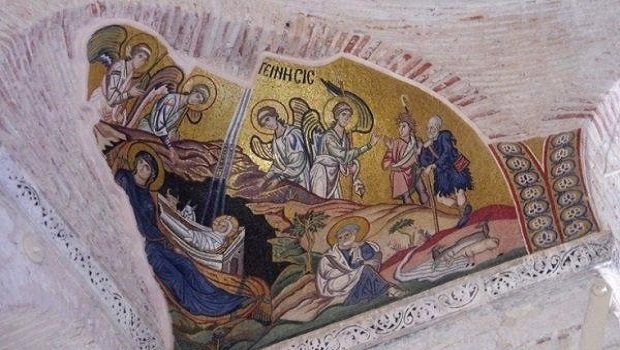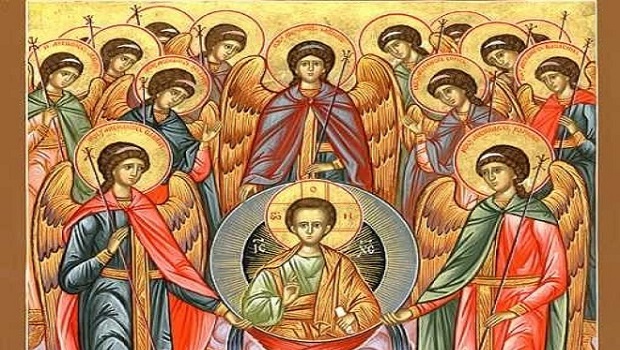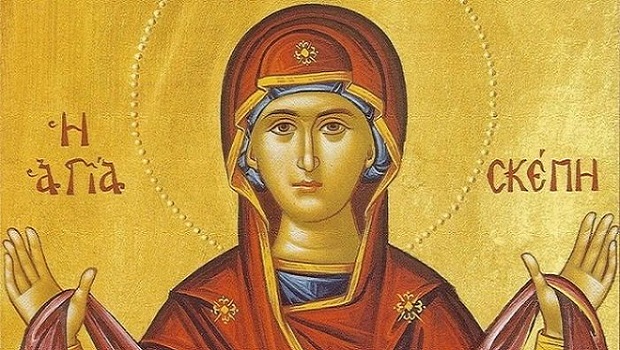Father Nikolaos Patsalos
Wealth or Spiritual Poverty?
Today’s Gospel reading is very well known. It’s the parable of the rich man and Lazarus and the subject it deals with is wealth, both material and spiritual.
The Gospel presents two people with entirely different lifestyles. One was rich, very much so, and was a man of means. He was comfortable and enjoyed all the comforts this fleeting life has to offer. Most of all, though, he was selfish, turned in on himself, ignoring the least of his brethren, who was right next to him.
This other person was at the opposite pole from the man who lived in luxury. He was a ‘poor Saint’, an unimportant, beleaguered, tormented and starving person, living in wretched conditions. The poor man, who had the humility of the Canaanite woman [Matth. 15, 21-8] had to make do with the crumbs which fell off the rich man’s table.
The chasm between the two men was enormous, as regards the quality of their humanity and virtue. Right at the beginning, the Gospel reading points this out in a simple manner. The rich man had plenty of coin, which guaranteed him an affluent lifestyle, but was insignificant and unsubstantial before God, since he isn’t even given a name [In some versions of the parable in English, he’s called ‘Dives’, but this is simply the Latin word for ‘a rich man’. WJL]. The poor and unhappy man in the Gospel, who bore the blessed name of Lazarus, was truly a disciple of the substantial, poor Incarnate Lord. It follows that the man who was celebrated in the world was anonymous as far as God was concerned, whereas the man who was anonymous in the world was much celebrated in the presence of God.
After this, the yawning gap between them is demonstrated more graphically in the after-life. When both of them were ‘carried away’, Lazarus was borne away by angels into Paradise, whereas the rich man was simply buried. Both of them continued to exist, as living souls, but with very different lifestyles. Their circumstances were reversed and the rich man had to experience the poverty of life in the darkness, while Lazarus enjoy the riches of life in the light of Paradise.
Too late, the man who had been rich in the world sought to change the unbearable surroundings in which he found himself. He also asked our forefather, Abraham, to send Lazarus to tell his brothers what to expect, since they had the same lifestyle as he’d once enjoyed.
The answer was short and sweet and directed him to the word of God, which teaches and guides all of us in the proper way of life that we should lead for our salvation. In the reasoning of the Gospel, how rich or poor you are is defined by the way in which you live. If you live and act in accordance with God’s word, you live in the Kingdom of God, insofar as you’re permitted to. Having as we do a very faint experience of salvation, we can understand that worldly poverty represents untold riches and is therefore worth suffering, as was the case of lowly and humble Lazarus.
Source: pemptousia.com
ABOUT THE ORTHODOX CHRISTIAN NETWORK
Orthodox Christian Network (OCN) is a 501(c)3 and an official agency of the Assembly of Canonical Bishops of the United States of America . It is a recognized leader in the Orthodox Media field and has sustained consistent growth over twenty-two years. We have worked to create a community for both believers and non believers alike by sharing the timeless faith of Orthodoxy with the contemporary world through modern media. We are on a mission to inspire Orthodox Christians Worldwide. Click to signup to receive weekly newsletter.
Join us in our Media Ministry Missions! Help us bring the Orthodox Faith to the fingertips of Orthodox Christians worldwide! Your gift today will helps us produce and provide unlimited access to Orthodox faith-inspiring programming, services and community. Don’t wait. Share the Love of Orthodoxy Today!
OCN has partnered with Pemptousia. A Contemporary post-modern man does not understand what man is. Through its presence in the internet world, Pemptousia, with its spirit of respect for beauty that characterizes it, wishes to contribute to the presentation of a better meaning of life for man, to the search for the ontological dimension of man, and to the awareness of the unfathomable mystery of man who is always in Christ in the process of becoming, of man who is in the image of divine beauty. And the beauty of man springs from the beauty of the Triune God. In the end, “beauty will save the world”.




0 Comments